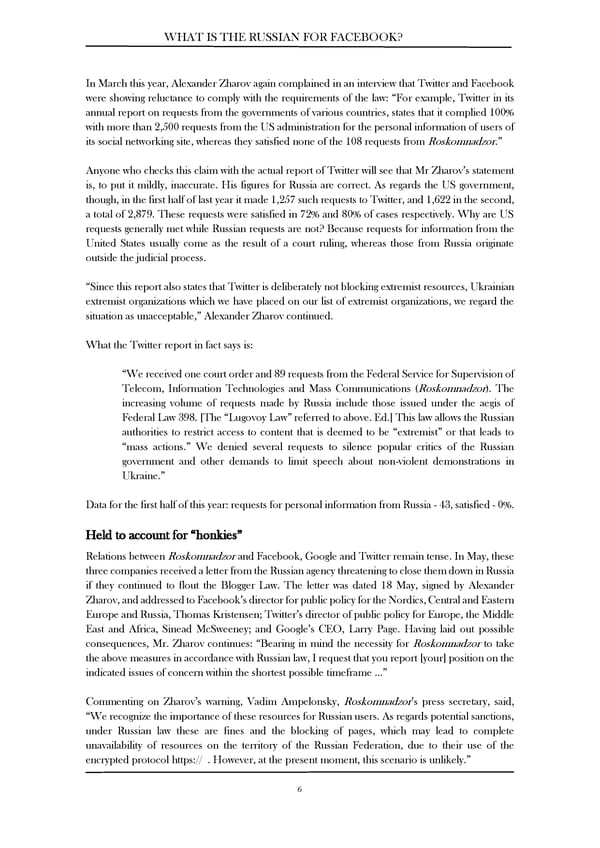WHAT IS THE RUSSIAN FOR FACEBOOK? In March this year, Alexander Zharov again complained in an interview that Twitter and Facebook were showing reluctance to comply with the requirements of the law: “For example, Twitter in its annual report on requests from the governments of various countries, states that it complied 100% with more than 2,500 requests from the US administration for the personal information of users of its social networking site, whereas they satisfied none of the 108 requests from Roskomnadzor.” Anyone who checks this claim with the actual report of Twitter will see that Mr Zharov’s statement is, to put it mildly, inaccurate. His figures for Russia are correct. As regards the US government, though, in the first half of last year it made 1,257 such requests to Twitter, and 1,622 in the second, a total of 2,879. These requests were satisfied in 72% and 80% of cases respectively. Why are US requests generally met while Russian requests are not? Because requests for information from the United States usually come as the result of a court ruling, whereas those from Russia originate outside the judicial process. “Since this report also states that Twitter is deliberately not blocking extremist resources, Ukrainian extremist organizations which we have placed on our list of extremist organizations, we regard the situation as unacceptable,” Alexander Zharov continued. What the Twitter report in fact says is: “We received one court order and 89 requests from the Federal Service for Supervision of Telecom, Information Technologies and Mass Communications (Roskomnadzor). The increasing volume of requests made by Russia include those issued under the aegis of Federal Law 398. [The “Lugovoy Law” referred to above. Ed.] This law allows the Russian authorities to restrict access to content that is deemed to be “extremist” or that leads to “mass actions.” We denied several requests to silence popular critics of the Russian government and other demands to limit speech about non-violent demonstrations in Ukraine.” Data for the first half of this year: requests for personal information from Russia - 43, satisfied - 0%. Held to account for “honkies” Relations between Roskomnadzor and Facebook, Google and Twitter remain tense. In May, these three companies received a letter from the Russian agency threatening to close them down in Russia if they continued to flout the Blogger Law. The letter was dated 18 May, signed by Alexander Zharov, and addressed to Facebook’s director for public policy for the Nordics, Central and Eastern Europe and Russia, Thomas Kristensen; Twitter’s director of public policy for Europe, the Middle East and Africa, Sinead McSweeney; and Google’s CEO, Larry Page. Having laid out possible consequences, Mr. Zharov continues: “Bearing in mind the necessity for Roskomnadzor to take the above measures in accordance with Russian law, I request that you report [your] position on the indicated issues of concern within the shortest possible timeframe ...” Commenting on Zharov’s warning, Vadim Ampelonsky, Roskomnadzor’s press secretary, said, “We recognize the importance of these resources for Russian users. As regards potential sanctions, under Russian law these are fines and the blocking of pages, which may lead to complete unavailability of resources on the territory of the Russian Federation, due to their use of the encrypted protocol https:// . However, at the present moment, this scenario is unlikely.” 6
 What is the Russian for Facebook? Page 6 Page 8
What is the Russian for Facebook? Page 6 Page 8